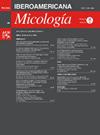Real-world use of isavuconazole in adult oncohematology patients
IF 1.6
4区 生物学
Q4 MYCOLOGY
引用次数: 0
Abstract
Isavuconazole has emerged as a significant antifungal agent in the treatment and prophylaxis of invasive fungal infections (IFIs) among immunocompromised patients, particularly those undergoing hematopoietic stem cell transplantation (HSCT) or receiving treatment for hematological malignancies. Real-world experience with the use of isavuconazole in oncohematological patients has increasingly been reported. Isavuconazole has demonstrated efficacy against a broad spectrum of fungal pathogens, with a favorable safety profile and lower rates of hepatotoxicity compared to other azoles. Isavuconazole is generally well-tolerated, making it suitable for long-term use in high-risk patients for both treatment and prophylaxis of IFIs. Isavuconazole can be considered a valuable treatment option for IFIs in patients with hematological malignancies and HSCT recipients. It may be a suitable alternative to other azoles, especially in patients with underlying liver dysfunction or those experiencing the effects of multiple drug interactions. Nevertheless, further research is needed to evaluate the long-term safety and efficacy of isavuconazole, particularly in specific patient populations and in combination with other antifungal agents. Overall, isavuconazole represents a promising addition to the antifungal armamentarium, offering a safer and more effective treatment option for patients at high risk of IFIs.
isavuconazole在成人血液病患者中的实际应用。
Isavuconazole已成为一种重要的抗真菌药物,用于治疗和预防免疫功能低下患者的侵袭性真菌感染(IFIs),特别是那些接受造血干细胞移植(HSCT)或接受血液恶性肿瘤治疗的患者。在血液病患者中使用异戊康唑的实际经验越来越多地被报道。与其他唑类药物相比,Isavuconazole具有良好的安全性和较低的肝毒性。Isavuconazole通常耐受性良好,因此适合高风险患者长期使用,用于治疗和预防ifi。Isavuconazole可以被认为是血液恶性肿瘤和造血干细胞移植患者ifi的有价值的治疗选择。它可能是其他唑类药物的合适替代品,特别是在有潜在肝功能障碍或经历多种药物相互作用的患者中。然而,需要进一步的研究来评估isavuconazole的长期安全性和有效性,特别是在特定患者群体和与其他抗真菌药物联合使用时。总体而言,isavuconazole是抗真菌药物的一个有希望的补充,为ifi高风险患者提供了更安全、更有效的治疗选择。
本文章由计算机程序翻译,如有差异,请以英文原文为准。
求助全文
约1分钟内获得全文
求助全文
来源期刊

Revista Iberoamericana De Micologia
MYCOLOGY-
CiteScore
1.90
自引率
0.00%
发文量
17
审稿时长
81 days
期刊介绍:
Revista Iberoamericana de Micología (Ibero-American Journal of Mycology) is the official journal of the Asociación Española de Micología, Asociación Venezolana de Micología and Asociación Argentina de Micología (The Spanish, Venezuelan, and Argentinian Mycology Associations). The Journal gives priority to publishing articles on studies associated with fungi and their pathogenic action on humans and animals, as well as any scientific studies on any aspect of mycology. The Journal also publishes, in Spanish and in English, original articles, reviews, mycology forums, editorials, special articles, notes, and letters to the editor, that have previously gone through a scientific peer review process.
 求助内容:
求助内容: 应助结果提醒方式:
应助结果提醒方式:


